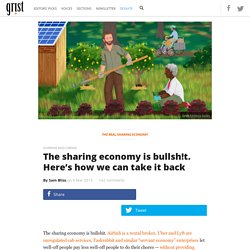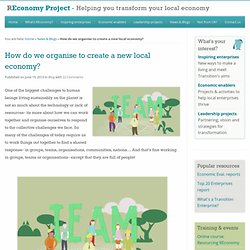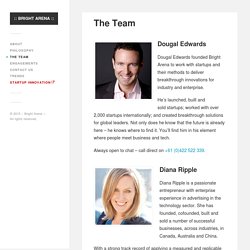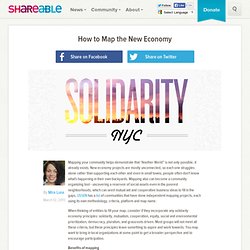

The sharing economy is bullsh!t. Here’s how we can take it back. The sharing economy is bullshit.

Airbnb is a rental broker. Uber and Lyft are unregulated cab services. Taskrabbit and similar “servant economy” enterprises let well-off people pay less well-off people to do their chores — without providing anyone the benefits and security of traditional employment. “Sharing” has been appropriated and stripped of all meaning by people trying to sell you things, much like sustainability was. Once “green” became hip and important about a decade ago, corporate bigwigs started preaching about sustainable profits and misleading eco-labels got slapped on single-use disposable plastic water bottles. A recent piece in The Nation indicted the so-called sharing economy on multiple counts: The sharing economy is a nice way for rapacious capitalists to monetize the desperation of people in the post-crisis economy while sounding generous, and to evoke a fantasy of community in an atomized population. And sharing, real sharing, is important. Hence this series. Business Education Alliance.
Economic Gardening. Podcast Show 155: Economic Gardening w/ Chris Gibbons. Alberta Innovation and Advanced Education. How do we organise to create a new local economy? You are here: Home » News & Blogs » How do we organise to create a new local economy?

One of the biggest challenges to human beings living sustainably on the planet is not so much about the technology or lack of resources- its more about how we can work together and organise ourselves to respond to the collective challenges we face. So many of the challenges of today require us to work things out together to find a shared response- in groups, teams, organisations, communities, nations….
And that’s fine working in groups, teams or organisations- except that they are full of people! So many social change groups and organisations who try and do things like create a more sustainable, resilient and equitable local economic system come up against the challenges of working together. But this is very often paid little attention, as people are so keen to just get on with it. It was Winston Churchill who said ‘”Democracy is the worst form of government, except for all the others”.
How the Economic Machine Works [Animation] by Ray Dalio. Problems of Economic Modernisation. From Globalization to Glocalization. Collaborative Community. Municipal Economic Development. Behavioral Economics. IEDC. EDANZ. Bright Arena. Dougal Edwards Dougal Edwards founded Bright Arena to work with startups and their methods to deliver breakthrough innovations for industry and enterprise.

He’s launched, built and sold startups; worked with over 2,000 startups internationally; and created breakthrough solutions for global leaders. Not only does he know that the future is already here – he knows where to find it. You’ll find him in his element where people meet business and tech. Always open to chat – call direct on +61 (0)422 522 339. Diana Ripple Diana Ripple is a passionate entrepreneur with enterprise experience in advertising in the technology sector.
With a strong track record of applying a measured and replicable approach to entrepreneurship, she thrives on helping other start-ups meet their vision of success. Alex Hadley. Emotional Economics: Measuring What Matters. Since the economy came crashing down on us in 2008, there’s been a growing consensus that our economic system as we know it is not sustainable.
What we’ve since learned is that money is fiction and the security we think we’ve been building all these years is a myth. Other than its dysfunction, nothing in the conventional economy seems real. So what does the new economy that everyone’s talking about look like? A clear theme at Sustainable Brands ’11 is the importance of our emotions, particularly happiness. In 1972, Bhutan’s former King Jigme Singye Wangchuck established the term “gross national happiness” which aims to measure quality of life or social progress as opposed to gross domestic product, which is only concerned with financial gains. Martin Seligman’s Flourish has been referenced frequently at the conference. It appears that if our population focused more on our spirituality, our empathy for flourishing enterprises would, ahem, flourish and our Wellness Economy would boom.
New Economy Organizations. How to Map the New Economy in Your City. Mapping your community helps demonstrate that “Another World” is not only possible, it already exists.

New economy projects are mostly unconnected, so each one struggles alone rather than supporting each other and even in small towns, people often don't know what's happening in their own backyards. Mapping also can become a community organizing tool - uncovering a reservoir of social assets even in the poorest neighborhoods, which can seed mutual aid and cooperative business ideas to fill in the gaps. USSEN has a list of communities that have done independent mapping projects, each using its own methodology, criteria, platform and map name. When thinking of entities to fill your map, consider if they incorporate any solidarity economy principles: solidarity, mutualism, cooperation, equity, social and environmental prioritization, democracy, pluralism, and grassroots driven.
Most groups will not meet all these criteria, but these principles leave something to aspire and work towards. Competitiveness through Innovation. New Economic Narratives.